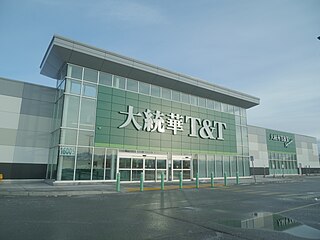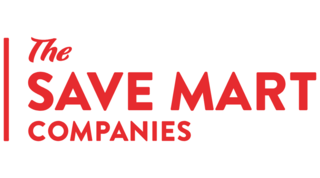Related Research Articles

A supermarket is a self-service shop offering a wide variety of food, beverages and household products, organized into sections. This kind of store is larger and has a wider selection than earlier grocery stores, but is smaller and more limited in the range of merchandise than a hypermarket or big-box market. In everyday United States usage, however, "grocery store" is often used to mean "supermarket".

A grocery store (AE), grocery shop (BE) or simply grocery is a foodservice retail store that primarily retails a general range of food products, which may be fresh or packaged. In everyday U.S. usage, however, "grocery store" is a synonym for supermarket, and is not used to refer to other types of stores that sell groceries. In the UK, shops that sell food are distinguished as grocers or grocery shops.

The Kroger Company, or simply Kroger, is an American retail company that operates supermarkets and multi-department stores throughout the United States.

T&T Supermarkets is a Canadian supermarket chain that sells primarily Asian foods, including fresh produce, meat, seafood, and Asian packaged goods. It also sells kitchenware and gifts, and has in-store kitchens and bakeries. T&T Supermarkets was founded in Vancouver in 1993 by Cindy Lee. It is currently led by CEO Tina Lee, who succeeded her mother in 2014. In 2009, T&T Supermarkets was acquired by Loblaw Companies Limited.

The Great Atlantic & Pacific Tea Company, better known as A&P, was an American chain of grocery stores that operated from 1859–2015. From 1915 through 1975, A&P was the largest grocery retailer in the United States.

Piggly Wiggly is an American supermarket chain operating in the American Southern and Midwestern regions run by Piggly Wiggly, LLC, an affiliate of C&S Wholesale Grocers. Its first outlet opened in 1916 in Memphis, Tennessee, and is notable as the first true self-service grocery store, and the originator of various familiar supermarket features such as checkout stands, individual item price marking and shopping carts. The company headquarters is in Keene, New Hampshire. 499 independently owned Piggly Wiggly stores currently operate across 18 states, primarily in smaller cities and towns.
Victor Value was a London-based value supermarket group that operated at the discount end of the grocery trade.

William Low plc was a chain of supermarkets based in Dundee, Scotland, until it was bought out by Tesco for £257M in 1994.
SuperValu, Inc., was an American wholesaler and retailer of grocery products. The company, formerly headquartered in the Minneapolis suburb of Eden Prairie, Minnesota, had been in business since 1926. It is a wholly owned subsidiary of United Natural Foods (UNFI).
The Nash Finch Company was a Fortune 500 company based in Edina, Minnesota, United States. The company was involved in food distribution to private companies, primarily independent supermarkets, and military commissaries; and the operation of retail stores.

The Penn Traffic Company was a food service company founded in 1854 in Johnstown, Pennsylvania.
Foodtown is a northeastern United States supermarket cooperative founded in 1955 by Twin County Grocers in New Jersey. Currently, there are 66 Foodtown stores in New Jersey, New York, and Connecticut. Foodtown's corporate offices are located in Iselin, New Jersey.

David Greig was initially a grocery store that grew to become one of the burgeoning supermarket chains in the United Kingdom. The original business was founded by the Greig family of Hornsey, North London. During the seventies, the business was first purchased by Wrensons, a Midlands-based grocery chain before the combined group took on the David Greig name. The combined company was purchased by British food conglomerate Fitch Lovell and was eventually merged into the group's supermarket chain Key Markets.
Roundy's Supermarkets is an American supermarket operator. It owns and operates stores under the names of Pick 'n Save, Metro Market, and Mariano's Fresh Market. The chain is a subsidiary of Kroger. Roundy's operates 149 supermarkets and 107 pharmacies throughout the states of Wisconsin and Illinois. Based on fiscal year 2012 sales, Roundy's was the 37th largest grocery store chain and the 89th largest retailer in the United States. As of December 2015, Roundy's became a subsidiary of Kroger of Cincinnati, Ohio.
Roy Furr was the president of the Furr's chain of supermarkets and restaurants after his older brother Key Furr.

Shoprite Limited was a community food store chain in the Isle of Man. It was a wholly owned subsidiary of Isle of Man Enterprises plc, until Tesco announced their purchase of the business on 9 October 2023.
Uniq plc was a British food manufacturer. Listed on the London Stock Exchange and once a constituent of the FTSE 100 Index, it was taken over by Irish foods conglomerate Greencore in 2011.

The Save Mart Companies is an American grocery store operator founded and headquartered in Modesto, California. It owns and operates stores under the names of Save Mart, Lucky, Lucky California, FoodMaxx, and Maxx Value Foods. The stores are located in northern and central California and northern Nevada.

Hannaford is an American supermarket chain based in Scarborough, Maine. Founded in Portland, Maine, in 1883, Hannaford operates stores in New England and New York. The chain is now part of the Ahold Delhaize group based in the Netherlands, and is a sister company to formerly competing New England supermarket chain Stop & Shop.
Wright's Biscuits was established in 1790 as L Wright & Son, in South Shields. In the 1930s they implemented intensive factory methods for production and became a national supplier of biscuits and cakes, and a leading employer in Tyne and Wear. They also ran a large chain of grocery stores under various names, and controlled fellow grocery chain Moores Stores. The business became part of James Goldsmith's Cavenham Foods group in 1971.
References
- ↑ Macmillan's Unquoted Companies. Macmillan Press. 1985. p. 339.
- ↑ Richard M. Laws (2017). Large Animals and wide Horizons. The Autobiography of Richard M. Laws. In three parts. Part I: Seals teeth and whales ears. Janus Publishing Company, Limited. p. 12. ISBN 978-1-85756-864-6.
- 1 2 "Laws Stores". Evening Chronicle. 10 December 2012.
- ↑ "Laws Stores Ltd. grocers". National Archives. Retrieved 1 March 2024.
- ↑ Wainwright, Martin (14 November 2013). "Grigor McClelland obituary". The Guardian.
- ↑ "Chain Store Directors Address". Newspaper World. No. 2815–2840. 1952. p. 222.
- ↑ Shaw, Gareth; Benson, John (1999). The Retailing Industry: 1945-Retail revolutions. I.B. Tauris. p. 30.
- ↑ "Adapting to the supermarket era". Brochure. No. 207–215. International Chamber of Commerce. 1960. p. 13.
- ↑ "Founder Grigor McClelland, CBE - Founder, Editor 1964-1966". Society for the Advancement of Management Studies. November 2013.
- ↑ "Loss of a clear, moral compass; William Grigor McClelland died on November 6. STEVE HILDITCH pays tribute". The Journal. 21 November 2013.
- ↑ "Stamps and Price Maintenance". The Statist. 182: 641. 1964.
- ↑ "Edinburgh development". The Estates Gazette. Vol. 248. 1978. p. 109.
- ↑ "Unigate sells Scottish Shops". Dairy Industries. Vol. 37. 1972. p. 677.
- ↑ A Study of the Evolution of Concentration in the Food Distribution Industry for the United Kingdom: Industry structure and concentration. Commission of the European Communities. 1976. pp. 222–230.
- 1 2 3 4 John Dawsond (1990). Competition and Markets. Essays in Honour of Margaret Hall. Palgrave Macmillan UK. p. 134. ISBN 9781349105106.
- 1 2 "Supermarket industry changes". Environment & Planning A. 28: 1474-1477. 1996.
- ↑ Restructuring Scottish grocery retailing: the rise and demise of Shoprite and Wm Low Article retrieved 25 November 2007.